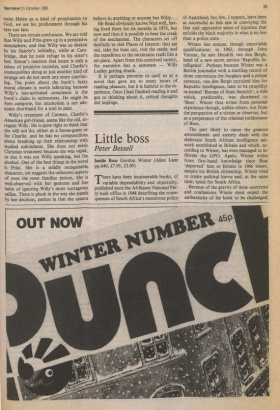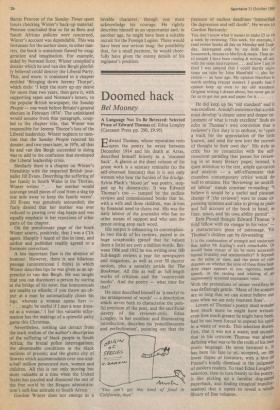Little boss
Peter Bessell
Inside Boss Gordon Winter (Allen Lane pp.640, £7.95, £3.95) rrhere have been innumerable books, of variable dependability and objectivity, published since the Afrikaner National Party took office in 1948 describing the consequences of South Africa's monstrous policy of Apartheid; but few, I suspect, have been as successful as this one in conveying the fear and oppressive sense of injustice that enfolds the black majority in what is no less than a police state.
Winter has unique, though unenviable qualifications: in 1963, through John Vorster, he met Hendrik van den Bergh, head of a new secret service 'Republic Intelligence'. Perhaps because Winter was a British journalist with a startling record of three convictions for burglary and a prison sentence, van den Bergh recruited him for Republic Intelligence, later to be (stupidly) re-named 'Bureau of State Security', a title which, predictably, was shortened to 'Boss'. Winter thus writes from personal experience though, unlike others, not from the perspective of a victim or observer, but as a perpetrator of the criminal ruthlessness of Boss.
The part likely to cause the greatest astonishment and anxiety deals with the elaborate South African intelligence network established in Britain and which, according to Winter, has even managed to infiltrate the GPO. Again, Winter writes from first-hand knowledge since Boss 'deported' him to Britain in 1966 where, despite his British citizenship, Winter tried to create political havoc and, at the same time, spied for South Africa.
Because of the gravity of these assertions and confessions Winter must expect the authenticity of his book to be challenged; Barrie Penrose of the Sunday Times spent hours checking Winter's back-up material. Penrose concluded that so far as Boss and South African policies were concerned, Winter's account was dependable. This was fortunate for the author since, in other matters, the book is sometimes flawed by exaggeration and imagination. For example, aided by Norman Scott, Winter compiled a dossier which he and van den Bergh gleefully believed could destroy the Liberal Party. This, and more, is contained in a chapter entitled 'Bringing down Jeremy Thorpe', which ends: 'I kept the story up my sleeve for more than two years, then gave it, with supporting tapes and Norman's letters, to the popular British newspaper, the Sunday People — one week before Britain's general election in February 1974'. The uninitiated would assume from that paragraph, coupled to the chapter title, that Winter was responsible for Jeremy Thorpe's loss of the Liberal leadership. Winter neglects to mention that the Sunday People rejected his dossier, and two years later, in 1976, all that he and van den Bergh succeeded in doing was to add to the confusion that enveloped the Liberal leadership crisis.
Similarly there is a chapter on Winter's friendship with the respected British journalist Jill Evans. Describing the suffering of her family in South Wales in the Thirties, Winter writes: . . . her mother would scavenge small pieces of coal from a slag tip one mile away to keep the family warm'. Jill Evans was genuinely astounded; she flatly denied that her mother was ever reduced to pawing over slag heaps and was equally emphatic in her rejections of other parts of the chapter.
On the penultimate page of the book Winter asserts, positively, that I was a CIA agent. Happily I heard of this in time, and author and publisher readily agreed to a footnote correction.
A less important flaw is the absence of humour. However, there is one hilarious passage (unintentional I think) in which Winter describes tips he was given as an apprentice to van den Bergh. He was taught that you can disconcert a person by staring at the bridge of his nose; that homosexuals are unable to whistle; if you throw an object at a man he automatically closes his legs, whereas a woman opens hers — . . . might be useful if I met a man dressed as a woman.' I feel this valuable information has the makings of a splendid party game this Christmas.
Nevertheless, nothing can detract from the stark realism of the author's description of the suffering of black people in South Africa; the brutal police interrogations; the abominable conditions in the black sections of prisons; and the ghetto city of Soweto which accommodates over one-anda-half million persecuted men, women and children. All this is not only moving but most valuable at a time when the United States has puzzled and dismayed the rest of the free world by the Reagan administration's soft-line attitude to South Africa.
Gordon Winter does not emerge as a lovable character, though one must acknowledge his courage. He rightly describes himself as an opportunist and, in another age, he might have been a suitable recruit for the Foreign Legion. There would have been one serious snag: the possibility that, for a small payment, he would cheerfully have given the enemy details of his regiment's position.







































 Previous page
Previous page